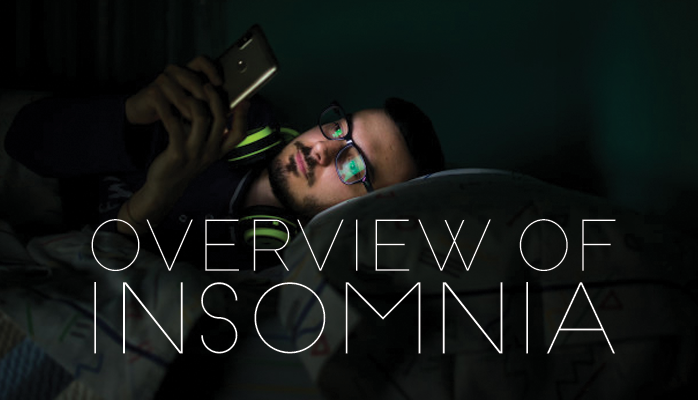What are the Two Types of Insomnia?
Insomnia is a sleeping disorder that consists of individuals struggling to achieve their nightly 8 hours. There are two types of insomnia, and two modes of insomnia.
The two types of insomnia are:
- Primary insomnia – insomnia with no clear, underlying issue
- Secondary insomnia – insomnia as a direct result of something else
The two modes of insomnia are:
- Acute insomnia – short term (1 month or less)
- Chronic insomnia – long term (greater than 1 month)
This means that there are four possible types of insomnia.
- Secondary/acute insomnia – temporary insomnia in response to a temporary illness, stress, etc.
- “Ever since my surgery two weeks ago I can’t get more than a couple hours of sleep per night”
- Primary/acute insomnia – temporary insomnia with no underlying cause
- “I just can’t seem to sleep at all this month”
- Secondary/chronic insomnia – long-term insomnia in response that is long-term and may be secondary to chronic conditions such as pain, long term illness, etc.
- “Ever since my back injury last year I wake up constantly throughout the night in pain”
- Primary/chronic insomnia – long-term insomnia with no discernable cause
- “I haven’t slept more than a few hours at a time all year and I don’t know why”
Causes of Short and Long-term Insomnia
Short-term insomnia can be primary, meaning it appears for a short duration of time before resolving. However, when it is secondary, then one of the following causes could be the culprit:
- Short term illness
- Jet lag
- Switching shifts at work
- Temporary regimens of medication
- Travel
- Significant stress (divorce, job loss, death of loved one, moving)
Usually, once these short-term causes are resolved, then so is the insomnia.
Causes of chronic, long-term insomnia include:
- Age-related sleep changes
- Chronic stress
- Chronic anxiety
- Depression
- Chronic pain
- Circadian rhythm disorders
- Dependence on certain medications
- Habitual life style choices
- Chronic substance abuse
- Especially in Alaska, seasonal effects or transitions (light/dark extremes)
Risk Factors for Insomnia
There are countless risk factors for developing insomnia, both internal and external risk factors that range from natural changes to external, chronic environmental stresses.
With age, sleep cycles change. Most individuals tend to go to bed earlier, wake up earlier, and require naps during the day. People over the age of 60-65 are more likely to have insomnia and report trouble with sleep. This is likely due to natural biological changes and the side effect of medications that become more common with age.
Other biological factors for developing insomnia is sex. Insomnia is more common in women than men. Factors such as pregnancy, premenstrual syndrome, and menopause can increase your risk for developing insomnia.
In addition to sex, other biological factors that can negatively impact sleep are medical conditions such as:
- Diabetes
- Kidney disease
- Lung disease
- Arthritis
- Heart disease
- Heavy smoking
- Sleep apnea
- Restless leg syndrome (RLS)
- Addiction
- Parkinson’s disease
- Alzheimer’s disease
- Mental disease
Those that experience these conditions could also take many medications that also induce insomnia:
- Diet pills
- Steroids
- High blood pressure medications
- Theophylline
- Phenytoin
- Levodopa
- Decongestants
Psychological factors are some of the most common root factors for developing primary insomnia, and include:
- Depression
- Anxiety
- Stress from marriage/job/health issues
Lastly, insomnia is also commonly caused by lifestyle choices that make sleep difficult, such as:
- Shift work
- Poor pre-sleep habits (screens, diet)
- Drinking before bed
- Drinking too much coffee
- Jet lag
- Poor sleep environment – noisy, bright, distractions, etc.
- Exercising close to bed time
Treatment for Acute and Chronic Insomnia
Insomnia treatment varies depending on the type of insomnia. Acute insomnia often goes away on its own, either due the the removal of its cause or an unexplained reason.
Chronic insomnia treatments may be a little less straightforward, and will likely require an intervention like:
- Therapy
- Education on good sleep habits
- Lifestyle changes
- Ways to reduce severity of chronic causes (such as pain treatment)
- Avoiding screens before bedtime
It is not recommended to treat chronic insomnia with over the counter pills, such as melatonin, because they may have undesired side effects and lose their effectiveness over time.
Treating insomnia will likely require direct consultation with your doctor or a sleep specialist who will perform a consultation and begin working through various treatment options until they find one that works best.
If you live in Alaska and are worried that you are struggling with insomnia, please contact one of our sleep specialists by clicking the orange button below to take a free online sleep test.


